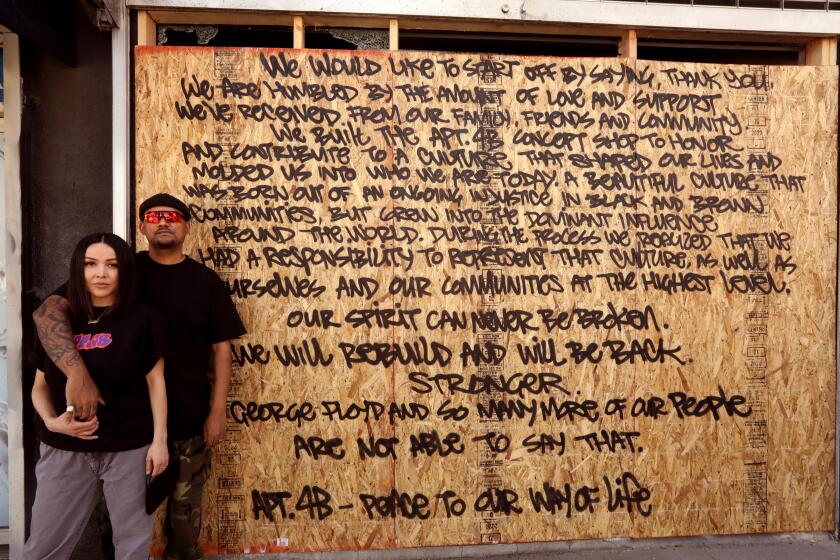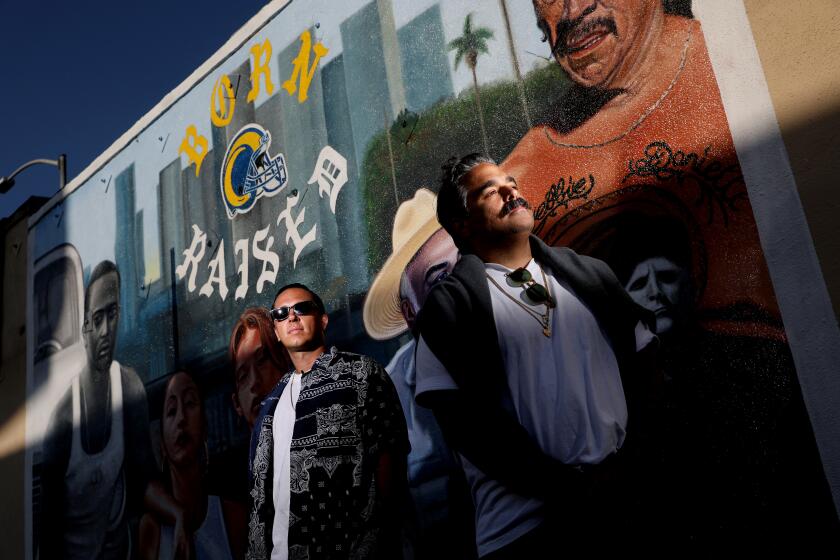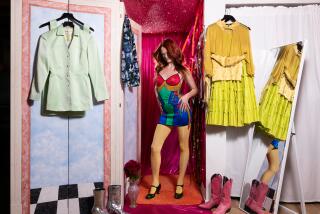Big fashion brands rushed to claim solidarity with Black Lives Matter. Streetwear designers are skeptical

- Share via
For more than a year, Los Angeles-based streetwear designer Tremaine Emory had been working with Converse on a red, green and black sneaker inspired by Jamaican political activist and Black nationalist Marcus Garvey’s Pan-African flag and artist David Hammons’ 1990 work “African-American Flag,” an original of which was acquired by the Broad museum in Los Angeles last year.
Emory’s brand, Denim Tears, tells the story of Black people in the United States starting in 1619, when the first documented enslaved Africans arrived in Virginia; according to the designer, the brand’s logo, a cotton plant, is a direct reference to slavery. That’s why the proposed packaging for his Converse sneaker collaboration depicts a coffin covered with Hammons’ flag and a cotton wreath, as a tribute to Black Americans who have died under unjust conditions. The image is based on an art installation, “A Proper Burial, Thanks America,” that Emory debuted in London last year.
However, in late May, as protests spread across the country after George Floyd’s death in police custody, Emory announced on Instagram that he and Denim Tears couldn’t go forward with the partnership until Converse’s parent company, Nike, went beyond its plan to donate $40 million over four years to support the Black community. (Michael Jordan, through his Nike subsidiary Jordan Brand, is donating an additional $100 million over 10 years.)
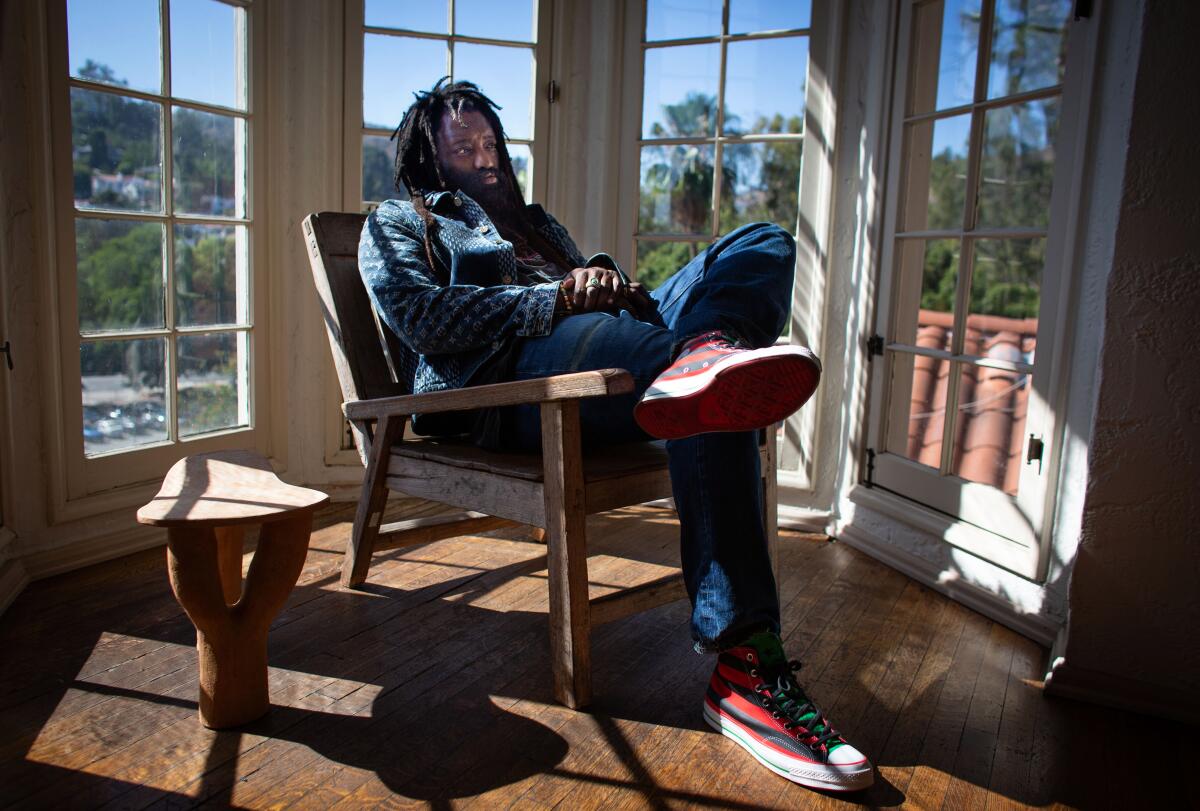
Emory called the move by Beaverton, Ore.,-based Nike, which reported $37.4 billion in revenue last fiscal year, a very expensive Band-Aid. He said he wanted to use his voice to push Nike to look inward at its own record on diversity and inclusion.
“It’s accountability,” Emory said in a phone interview. “It’s about Fortune 500 companies and how they are run under the guise of white supremacy and patriarchy and how I take accountability, that I need to see the steps — and brands that I work with dispensing that — or guys won’t work with me.”
In recent months, nearly all major industries, including entertainment, journalism and sports, have been forced to confront how closely their statements opposing systemic racism align with their treatment of Black and brown employees. The fashion industry, which has frequently been criticized for cultural appropriation, instances of blackface and a lack of diversity, is no different.
According to a count by trade publication Women’s Wear Daily, Black people make up only 4% — 19 out of 477 members — of the invitation-only Council of Fashion Designers of America, whose new chairman is Tom Ford. In an email to The Times, a CFDA spokesman said, “The CFDA does not record nor require members to state their race upon application, but it is estimated that members of color make up approximately 25% of the total membership.”
As L.A.’s streetwear scene picks up the pieces after local stores were robbed, many store owners reflect on the bigger picture: standing in solidarity with protesters.
In anecdotal comments, Black streetwear designers from L.A. to New York told The Times that their subset of the fashion industry is no different.
“You can’t ignore the fact that there aren’t many Black brand owners in the streetwear space,” said Scott Sasso, who founded 10.Deep in 1995 while he was a student at Vassar. “And [at] some of the biggest companies, I don’t know if they’ve even had Black employees.”
Streetwear brands such as Denim Tears and 10.Deep offer casual clothing, primarily for men, that blend the styles of various subcultures, including hip-hop (as popularized in the 1990s by brands such as FUBU, Walker Wear and Phat Farm) as well as surf and skate motifs. It’s an identity that can be found in the clothing from brands such as Supreme and Stüssy. Instead of offering widely available, mass-produced products, streetwear brands tend to offer limited-edition drops for consumers who hear about companies through social media or by word of mouth.
Although Black style — from hip-hop to sneaker culture — has played a major role in shaping the fashion industry while bringing new designers and brands to prominence, Black fashion professionals and streetwear brand owners said in interviews with The Times that the clothing industry has failed to elevate and promote Black creatives in a way that reflects that influence.
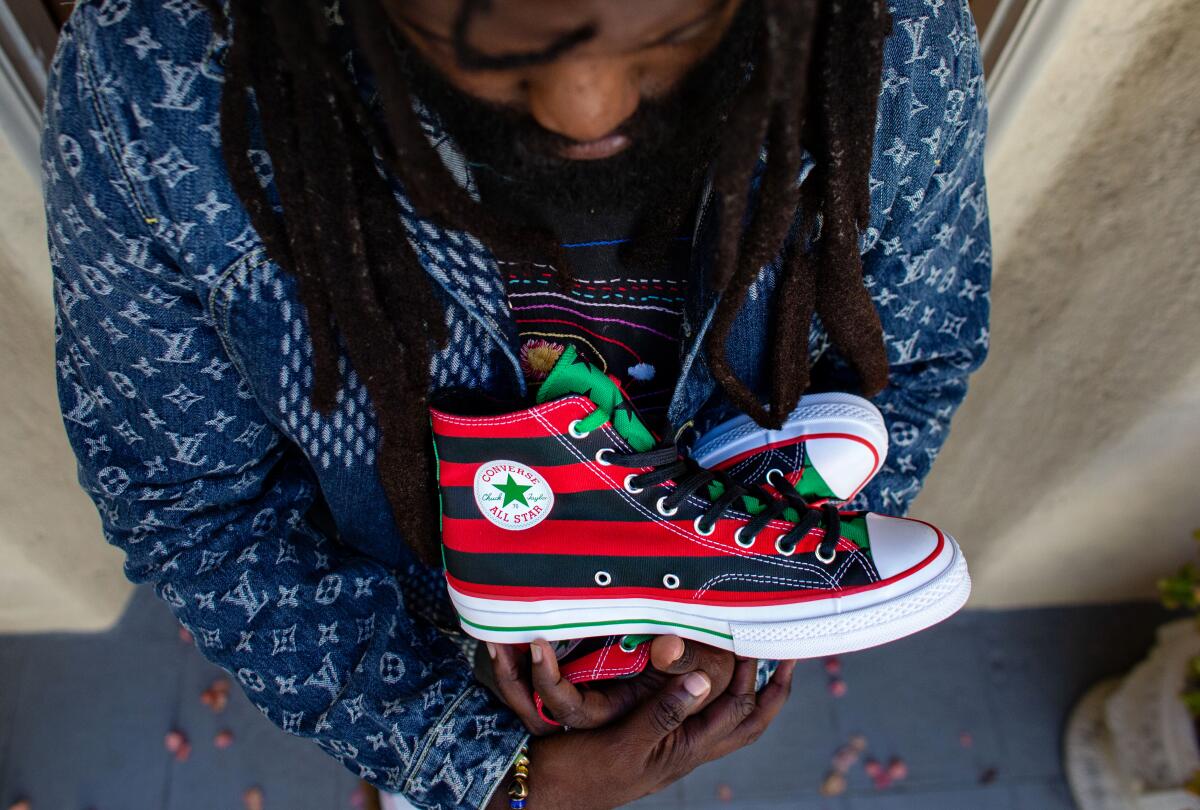
Several designers also questioned the sincerity of corporations promising to invest in Black communities. They reflected on their own experiences trying to explain Black art to predominantly white company leaders.
Chicago-based designer Joe Freshgoods started selling T-shirts in high school and has been selling his designs out of Fat Tiger Workshop, the streetwear retail hub he co-owns, since 2013.
“I feel like a lot of these brands are in these boardrooms having these talks about how to fix this or how to just clean up their mistakes real fast, and it’s just like, ‘Hey, let’s just fill in the blanks real quick and see if this will make them happy,’” Freshgoods said.
He said he tried to include the logo of the Black Panther Party on a design for an Oakland-themed collaboration with an apparel brand last year. The company’s legal department rejected his proposal. At the time he went along with it, but now he’d push back, he said.
“A lot of Black collaborators are the reason why a lot of brands are super successful right now, so that’s a lot of power to have,” Freshgoods said.
Emory, who has partnered with New Balance and Levi’s, called on Nike to stop supporting Republicans while President Trump is the party’s leader. He also wants the company to release more information on its record of hiring Black employees and assist in “the defunding and total reform of all the police departments across America.”
Since his initial Instagram post in June, Emory has spoken to Converse Chief Executive G. Scott Uzzell or Uzzell’s team about a half dozen times over the phone or in video-conference meetings. In those discussions, Emory said the company acknowledged it hasn’t done everything it could in terms of creating a diverse corporate structure and laid out its hiring plan, especially in its executive suite. The designer said he discussed current initiatives at Nike to invest in Black communities and to address systemic racism and police brutality. “They want to get involved in all that, and we will see,” he said.
The release date for his red, black and green Converse sneaker has been moved up from February to October, ahead of the November election. Emory said the marketing for the shoe will focus on promoting voting. The shoe will be available in North America, Europe and online for $95 to $100.
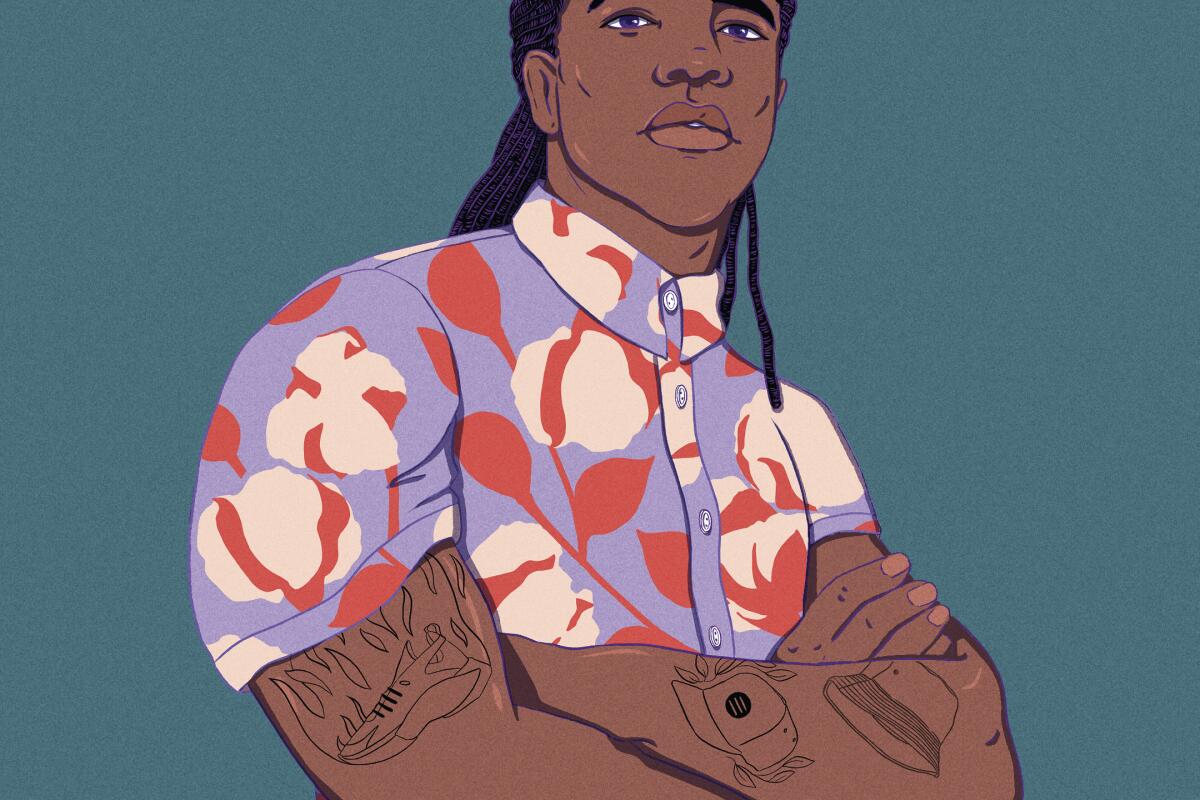
“We respect and encourage the efforts of any collaborator or athlete we work with to raise their voice against racial injustice,” a Converse spokesperson said in a statement to The Times. “We have spoken with Tremaine and look forward to working through these issues together.”
At its core, streetwear is about authenticity and the personal connection between consumers and the designers and labels they love.
The push by larger brands and corporations — specifically in the fashion industry — to meet the current moment with statements, donations and new initiatives is in direct contrast to what many Black streetwear designers have been doing since the inception of their brands. Those designers have been hiring diverse staff, speaking up about political issues and infusing their works with references to Black culture.
“Now I feel like everybody’s rushing to make some type of relevant shirt or make some relevant message on their Instagram,” said Zac Clark, a Black designer who started his brand, FTP, while in high school in Los Angeles. “To me, a lot of this stuff right now seems very unnatural and just forced from a lot of these brands, so they won’t get ‘canceled.’”
Meet the guys behind Venice label Born X Raised. They have a hit Rams collaboration — and designs on the world.
Olivia Anthony, the designer behind the Livstreetwear brand, said the turning point for her New York-based company was her 2017 My Love Letter to Our Culture collection, which paid tribute to Black trends of the ’90s — think long nails, grills and slicked-down baby hairs — that were largely considered unfashionable until they were adopted by other races.
“It was so beautiful, but it was looked down upon,” said Anthony, adding that she wanted her brand to reflect how those Black trends, now featured in magazines including Vogue, have been “shown in a different light.”
Kacey Lynch said he created his South L.A.-based streetwear company, Bricks & Wood, after years of working at streetwear brands where he felt Black representation was missing.
“They wanted a lot from us, but they didn’t want to do the work, what it took to understand us,” Lynch said of his past employers. “Whether that’s Black culture, South-Central, minorities … wherever the cool came from, they all wanted it but they didn’t really know how to identify with it.”
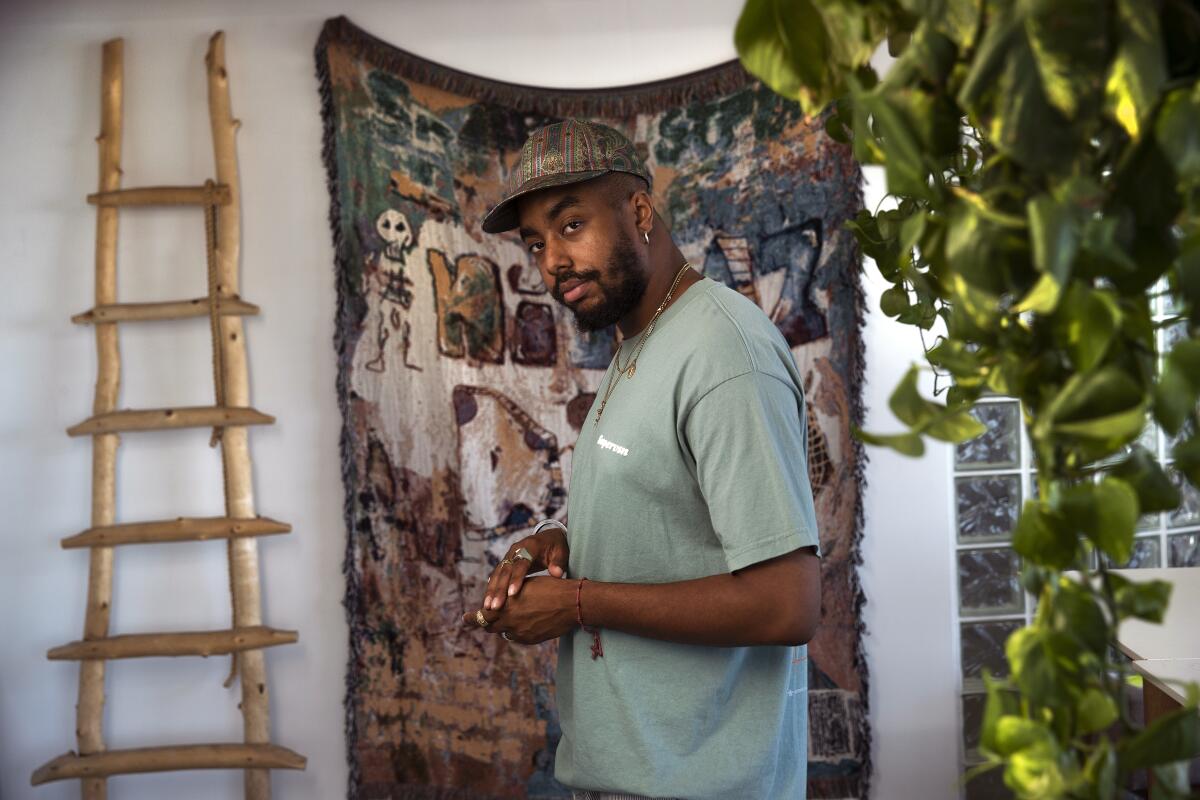
In May 2019, fashion website Hypebeast and Strategy&, a consulting firm in the PwC network, released its Streetwear Impact Report, based on interviews with more than 40,000 Hypebeast readers and 700 global industry insiders. The survey found that 70% of respondents said they care about social issues, 59% said brand activism is important and 47% said they would stop shopping from a brand because of inappropriate behavior.
“It’s fine as a starting point for corporations to say, ‘This is what we stand for and this is what we believe,’” said Elena Romero, a fashion journalist and author of 2012’s “Free Stylin’: How Hip Hop Changed the Fashion Industry.”“But that’s not going to be enough.”
Romero, an assistant professor at New York’s Fashion Institute of Technology, said companies likely will face questions over where they invest their profits, the diversity of their staff and how they’ve helped build the communities from which their dollars are coming. She said many companies will realize they’ve fallen short because the answers to those questions weren’t a priority until their profits were at risk.
“Now the consumer is saying, ‘You can’t fool us anymore,’” she said. “If you’re not authentic and truly supporting the very same things that these young people believe, your business will suffer.”
The result has been an industrywide push to make those investments now but also to make amends for past inaction. After Black Adidas employees criticized the company’s response to racism, Adidas announced June 9 that it would add more diverse staff, start a scholarship program for Black employees and invest an additional $20 million over four years in programs that serve the Black community. A day later, Adidas upped its $20 million pledge to $120 million. (In addition to those changes at Adidas, the company’s global head of human resources, Karen Parkin, resigned at the end of June after facing criticism for her handling of racial discrimination.)
Adidas also apologized for its past silence. “For most of you, this message is too little, too late,” a tweet from the Adidas account read. “We’ve celebrated athletes and artists in the Black community and used their image to define ourselves culturally as a brand but missed the message in reflecting such little representation within our walls.”
In the broader fashion community, various organizations and members of the industry have offered different strategies for creating a more inclusive environment. Aurora James, a New York-based creative director, started the Fifteen Percent Pledge, which calls on companies to provide at least 15% of their shelf space or contracts to Black-owned businesses.
Los Angeles designers and influencers talk about how Black Lives Matter protests and this year’s Pride Month have reshaped their thoughts on the fashion industry.
After the CFDA announced its plan to promote diversity, a group called the Kelly Initiative called for the CFDA to adopt its proposal to conduct and publish a census of diversity in the industry, audit its recruitment practices and release an annual list of top Black talent, the Kelly List. The initiative is named after the late Patrick Kelly, a Black fashion designer who rose to prominence in the 1980s with work that played with Black cultural symbols and racial stereotypes.
April Walker, whose New York brand Walker Wear was worn by ’90s hip-hop stars including Method Man, Tupac Shakur and the Notorious B.I.G., stressed that Black designers need to look outside the fashion industry for success by collaborating, mentoring and sharing resources with their counterparts.
“We just need to not look for the fashion industry, as it’s been very oppressive for the last 30 years, to be the end-all, be-all for our opportunities,” she said, “but to create our own.”
Among streetwear companies, the effort to fight systemic racism in the country and the fashion industry has been on an individual basis, with brand owners of all races deciding how much they’re willing to give back and how comfortable they are using their platforms to discuss and condemn racism.
For some, that means speaking up in solidarity with the Black community. Bobby Kim, cofounder of the Hundreds, a Vernon-based clothing brand, teamed with Pharrell Williams’ brand Billionaire Boys Club to raise money for Black Lives Matter and the Black Mental Health Alliance with a shirt that was available for 48 hours. After the Fairfax shopping district where his shop is located was vandalized in late May, Kim, who’s Korean American, defended the right to protest.
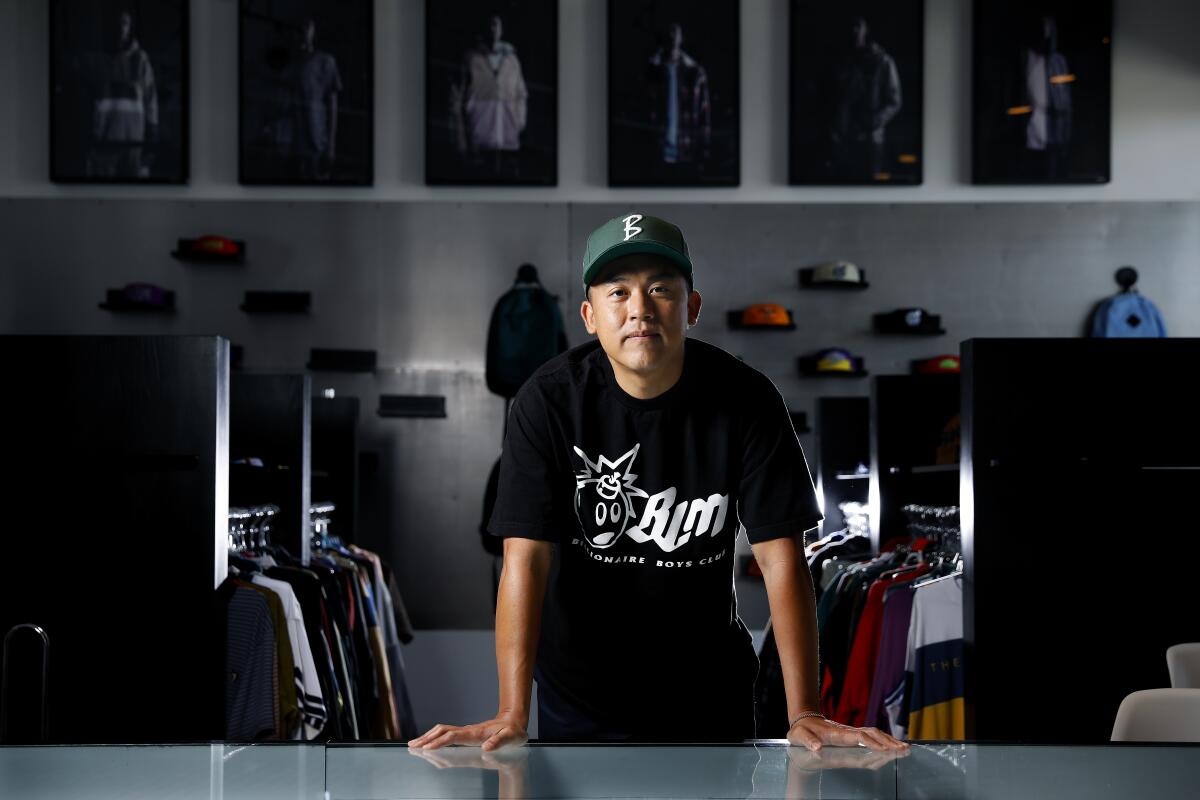
In an interview, Kim said, “If you have been given a lot of money, and especially if that money has come by way of participating, contributing, or even stealing or borrowing from Black culture, then you — more than anybody else right now — need to tithe, need to pay up, in a sense, in order to reflect how influential Black culture has been in your career and your profitability as a company.”
Sasso’s 10.Deep stopped selling its regular collection for most of June and instead offered a new line of 10.Deep products to draw attention to activism against racial injustice and police brutality. The profits went to national bail funds for protesters.
“Streetwear, in its truest form, is about shooting yourself in the foot as often as possible but also just doing what you think is right,” Sasso said.
He said he was drawn to streetwear because it was a multiethnic community of different countercultures, a blend of the skate, surf, hip-hop and graffiti scenes, with a dash of punk rock, united by an exclusive knowledge of where to find and buy certain brands.
However, he has noticed a shift among streetwear consumers. For some shoppers, it’s not about the community. It’s just about the clothes.
He said he lost “several thousand” social media followers after he posted about Black Lives Matter and has received comments asking him to just stick to fashion.
“My thought is: If you want just some regular clothes, go buy Banana Republic, go buy Levi’s,” he said. “Those are companies that aren’t gonna take political stances. They’re providing basic stuff. This space is about a culture. If you want to participate in it, this is what it’s about.”
More to Read
Sign up for The Wild
We’ll help you find the best places to hike, bike and run, as well as the perfect silent spots for meditation and yoga.
You may occasionally receive promotional content from the Los Angeles Times.
